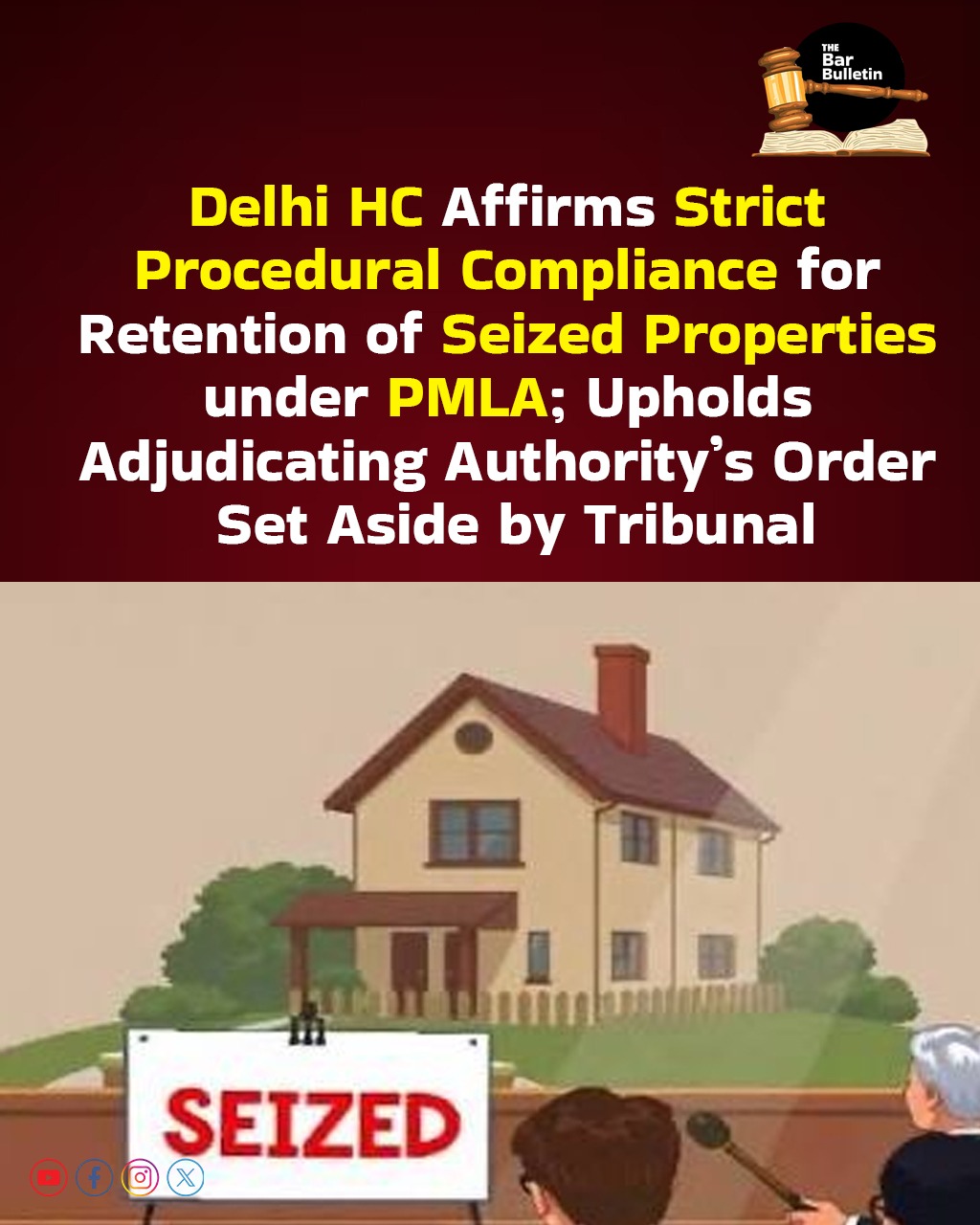The Delhi High Court dismissed the appeal filed by the Enforcement Directorate (ED) against the order of the Appellate Tribunal (PMLA) that set aside the Adjudicating Authority’s retention order for seized properties under the Prevention of Money Laundering Act (PMLA).
The ED appealed under Section 42 of the PMLA against the Tribunal’s order dated 06.02.2019, setting aside the Adjudicating Authority’s order dated 21.08.2017, which had allowed the ED to retain seized properties of the Respondent, Rajesh Kumar Agarwal. The ED contended that continued retention was valid due to ongoing prosecution and adherence to procedural requirements, seeking reversal of the Tribunal’s decision.
The case arose from an investigation into alleged money laundering through corporate entities linked to the Jain brothers. The ED conducted search and seizure in May 2017 at the Respondent’s office, seizing files, electronics, and cash. ED filed an application for retention of seized property under Section 17(4) of the PMLA before the Adjudicating Authority, which was granted. The Respondent appealed this order before the Tribunal, which set it aside for lack of substantive consideration and procedural irregularities, specifically non-compliance with provisions of Sections 17 and 20 of the PMLA governing retention.
In the instant appeal, ED argued that Sections 17(4) and 20 operate independently and that retention was justified given pendency of prosecution and there is no requirement for prior order under Section 20 before applying under Section 17(4).
On the other hand, respondent contended strict adherence to the procedural mandate in Section 20, including recording “reason to believe” and forwarding detailed material to the Adjudicating Authority, was mandatory, and failure thereof vitiated retention.
The Bench comprising Justice Subramonium Prasad and Justice Harish Vaidyanathan Shankar upheld the Tribunal’s view that the retention order was mechanically passed without statutory reasoning and without proper compliance of the safeguards laid down in Section 20 of the PMLA. The Court also referred to Supreme Court precedents to emphasize the principle that statutory safeguards serve to protect property rights and prevent arbitrary deprivation.
The Court clarified that seizure under Section 17 and retention under Section 20 form an integrated procedure, and retention beyond 180 days requires an order under Section 20 recording a reasoned belief based on material. Section 17(4) application for retention does not dispense with or substitute compliance with Section 20. The Adjudicating Authority’s order is to confirm retention based on prima facie involvement in money laundering, but cannot substitute for prerequisite retention order under Section 20.
Based on the above reasoning, the Court held that retention orders lacking reasoned inquiry and adherence to procedural safeguards are void ab initio. The Court reaffirmed that rights to property under Article 300A require strict compliance with statutory procedure before deprivation.
In result, the Delhi High Court upheld the Tribunal’s decision to set aside the Adjudicating Authority’s retention order due to inadequate and procedural non-compliance under Sections 17 and 20 of the PMLA. The appeal was dismissed with no order as to costs, affirming stringent adherence to statutory procedures as central to PMLA enforcement actions.
Cases relied on:
1. Perumon Bhagvathy Devaswom v. Bhargavi Amma, (2008) 8 SCC 321
2. Northern Railway v. Pioneer Publicity Corpn. (P) Ltd., (2017) 11 SCC 234
3. OPTO Circuits (India) Ltd. v. Axis Bank, (2021) 6 SCC 707
4. State of Orissa v. Mamata Mohanty, (2011) 3 SCC 436
5. Laxman Lal v. State of Rajasthan, (2013) 3 SCC 764
6. Sukh Dutt Ratra v. State of Himachal Pradesh, (2022) 7 SCC 508
7. Ritesh Tewari v. State of U.P., (2010) 10 SCC 677
Appearances:
For the Appellant: Mr. Samrat Goswami, Advocate
For the Respondent: Mr. Amit Khemka, Mr. Sandeep Dash, Ms. Himani Singh and Ms. Jeevika Dhyani, Advocates

